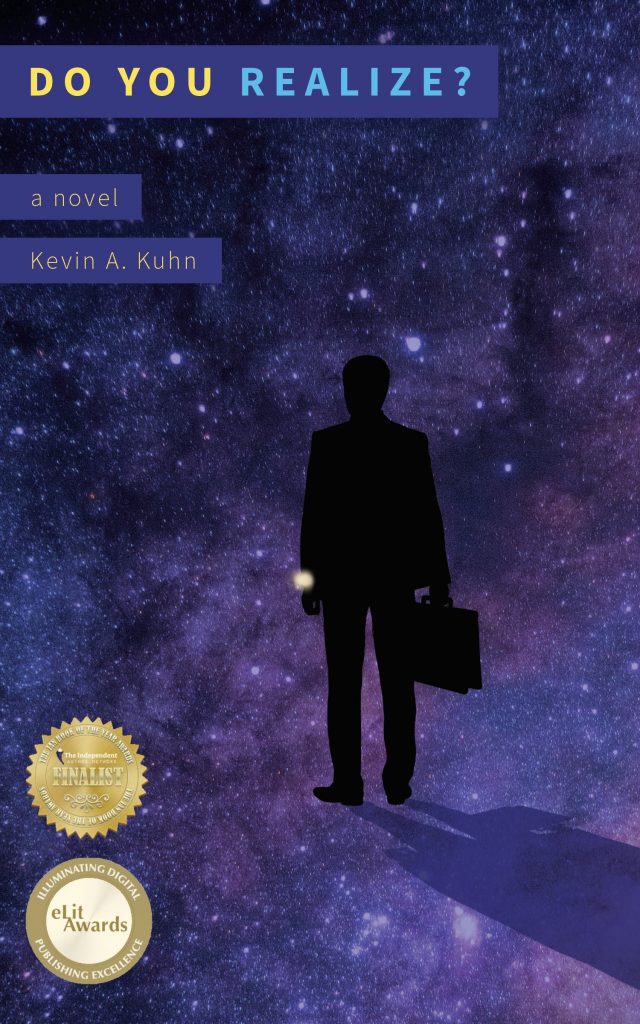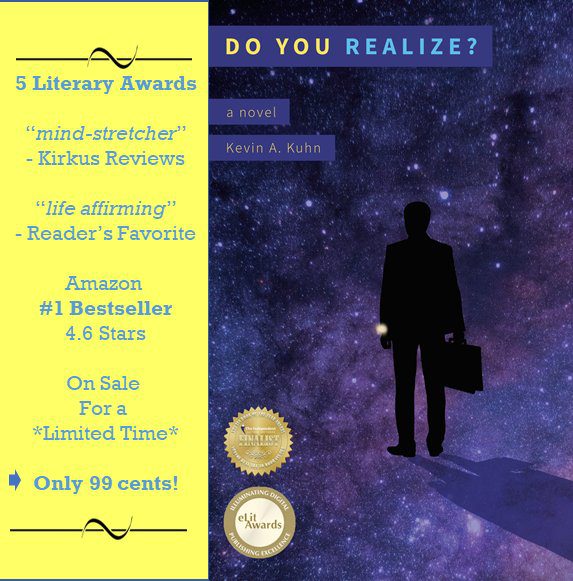The author, Kevin Kuhn, of ‘Do you realize?’, a book which won the 2018 eLit Book Gold Medal for Science Fiction, in conversation with Swati. A Different Truths exclusive.
Kevin Kuhn is the author of ‘Do you realize?’, a book which won the 2018 eLit Book Gold Medal for Science Fiction, Bronze medal- Visionary Fiction at Reader’s Favorite International Book Awards, was a finalist in the Next Generation Indie Book Awards-Inspirational Fiction, IAN-Book of the Year-Science Fiction and at National Indie Excellence Awards- Visionary Fiction. Kevin is an active member of the Science Fiction and Fantasy Writers of America and lives in Eden Prairie, Minnesota, with his wife Melinda, and three children.

In conversation with Swati, Kevin answered some interesting questions regarding his work, inspirations and quirks.
 Swati: When did you first realize you wanted to be a writer?
Swati: When did you first realize you wanted to be a writer?
![]() Kevin: I have loved to read since I was a child, and I believe this is a big part of becoming a writer. I first tried to write a novel in my thirties but found I didn’t have enough to say. When I hit fifty, I went through a mid-life crisis and began writing to work through my feelings. I decided to work my thinking into a novel and found I very much enjoyed the process. It’s never too late to start.
Kevin: I have loved to read since I was a child, and I believe this is a big part of becoming a writer. I first tried to write a novel in my thirties but found I didn’t have enough to say. When I hit fifty, I went through a mid-life crisis and began writing to work through my feelings. I decided to work my thinking into a novel and found I very much enjoyed the process. It’s never too late to start.
 Swati: What do you think makes a good story?
Swati: What do you think makes a good story?
![]() Kevin: I think a good story first must be readable and well edited. Next, it should engage the reader in a way that creates a story in their mind. If an author can also explore important themes and get the reader to do the same, then it has the chance to become a great book.
Kevin: I think a good story first must be readable and well edited. Next, it should engage the reader in a way that creates a story in their mind. If an author can also explore important themes and get the reader to do the same, then it has the chance to become a great book.
 Swati: What was one of the most surprising things you learned in creating your stories/books?
Swati: What was one of the most surprising things you learned in creating your stories/books?
![]() Kevin: As I strove to become a writer, I quickly learned the importance of ‘showing’ the story. My instincts often were to ‘tell’ the story through narration. Readers want to experience the story by the actions and dialog of the characters. They lose interest when the narrator tells the feeling or motivation of the characters. Through ‘telling’ the characters become puppets and the story loses the ‘real life’ illusion. Readers want to be challenged, they want to infer things, deduce things, and experience the story the way they would real life. This was an important revelation to me.
Kevin: As I strove to become a writer, I quickly learned the importance of ‘showing’ the story. My instincts often were to ‘tell’ the story through narration. Readers want to experience the story by the actions and dialog of the characters. They lose interest when the narrator tells the feeling or motivation of the characters. Through ‘telling’ the characters become puppets and the story loses the ‘real life’ illusion. Readers want to be challenged, they want to infer things, deduce things, and experience the story the way they would real life. This was an important revelation to me.
Readers want to experience the story by the actions and dialog of the characters. They lose interest when the narrator tells the feeling or motivation of the characters.
 Swati: What is your main source of ideas/inspirations while writing?
Swati: What is your main source of ideas/inspirations while writing?
![]() Kevin: I pull much from my life. I wanted to pass on what I’ve learned and what I’ve found to be valuable. I incorporated facts and information from non-fiction books that I believe are often ignored but are important to our approach to life. I also pulled from other stories I enjoy. The movie, ‘It’s a Wonderful Life’is a favorite and was an inspiration for ‘Do You Realize?’. Music can inspire me as well, and I listen to music while I write.
Kevin: I pull much from my life. I wanted to pass on what I’ve learned and what I’ve found to be valuable. I incorporated facts and information from non-fiction books that I believe are often ignored but are important to our approach to life. I also pulled from other stories I enjoy. The movie, ‘It’s a Wonderful Life’is a favorite and was an inspiration for ‘Do You Realize?’. Music can inspire me as well, and I listen to music while I write.
 Swati: What inspired you to create a character like Shiloh?
Swati: What inspired you to create a character like Shiloh?
![]() Kevin: I wanted a character that would push my main character (George) to question his life. He had fallen into a rut and need to be pushed from his comfort zone. I also wanted a distinctive character that was a bit mysterious and intrigued the reader. I love mystery in books, and I wanted to provide that to my readers. I wanted the reader to have a strong desire to understand Shiloh’s backstory.
Kevin: I wanted a character that would push my main character (George) to question his life. He had fallen into a rut and need to be pushed from his comfort zone. I also wanted a distinctive character that was a bit mysterious and intrigued the reader. I love mystery in books, and I wanted to provide that to my readers. I wanted the reader to have a strong desire to understand Shiloh’s backstory.

I wanted a character that would push my main character (George) to question his life. He had fallen into a rut and need to be pushed from his comfort zone.
 Swati: What was one most surprising thing you learned while writing ‘Do You Realize?’
Swati: What was one most surprising thing you learned while writing ‘Do You Realize?’
![]() Kevin: I didn’t know the ending of my story when I started writing. I developed strong characters and stayed true to their motivations instead of having a strict plot outline. I was surprised at how well this worked. I think you must have some idea of your plot line, but you can’t let that get in the way of your character’s authentic reactions. You must also have the courage to continue without knowing how everything will work out.
Kevin: I didn’t know the ending of my story when I started writing. I developed strong characters and stayed true to their motivations instead of having a strict plot outline. I was surprised at how well this worked. I think you must have some idea of your plot line, but you can’t let that get in the way of your character’s authentic reactions. You must also have the courage to continue without knowing how everything will work out.
 Swati: What would you say is your interesting writing quirk?
Swati: What would you say is your interesting writing quirk?
![]() Kevin: I get most of my ideas while walking. Whenever I get stuck or feel like my writing isn’t up to par, I go for a solitary walk in nature. For some reason this seems to open up my thinking for new ideas and new directions. It’s sort of my secret weapon. My biggest challenge is keeping it all in my head while I walk so, I can quickly write it all down as soon as I get home.
Kevin: I get most of my ideas while walking. Whenever I get stuck or feel like my writing isn’t up to par, I go for a solitary walk in nature. For some reason this seems to open up my thinking for new ideas and new directions. It’s sort of my secret weapon. My biggest challenge is keeping it all in my head while I walk so, I can quickly write it all down as soon as I get home.
 Swati: May we have your views regarding traditional publishing and self-publishing.
Swati: May we have your views regarding traditional publishing and self-publishing.
![]() Kevin: I’m a fan of both. Traditional publishing produces excellent, quality books on a regular basis and being a reader, I greatly appreciate there is a structure to support and invest in professional authors. Self-publishing is really exploding now and without it, for example, we wouldn’t have the gripping ‘The Martian’by Andy Weir or the unusual ‘Senlin Ascends’ by Josiah Bancroft. It’s really a great opportunity for new authors to get a start and learn about the publishing business. Anything that results in getting good stories into the hands of readers is a positive in my opinion.
Kevin: I’m a fan of both. Traditional publishing produces excellent, quality books on a regular basis and being a reader, I greatly appreciate there is a structure to support and invest in professional authors. Self-publishing is really exploding now and without it, for example, we wouldn’t have the gripping ‘The Martian’by Andy Weir or the unusual ‘Senlin Ascends’ by Josiah Bancroft. It’s really a great opportunity for new authors to get a start and learn about the publishing business. Anything that results in getting good stories into the hands of readers is a positive in my opinion.
Self-publishing is really exploding now…. It’s really a great opportunity for new authors to get a start and learn about the publishing business.
 Swati: What would you suggest that may help upcoming authors?
Swati: What would you suggest that may help upcoming authors?
![]() Kevin: Write often and finish what your start. Writing is a muscle and it becomes stronger the more you use it. It’s easy to start a story, but difficult to finish. I find a book picks up weight as you progress. It’s also easy to get caught up in the imperfections of your story and continually revisit earlier sections of your story. Writing is rewriting, so finish your story first and then rewrite. Finishing gives you the freedom to really focus on the rewrites. Also, write your first draft for yourself, then do your rewrites being conscious of your readers. Your story must come from within, but you also need to put yourself in the mind of the reader when you edit and rewrite.
Kevin: Write often and finish what your start. Writing is a muscle and it becomes stronger the more you use it. It’s easy to start a story, but difficult to finish. I find a book picks up weight as you progress. It’s also easy to get caught up in the imperfections of your story and continually revisit earlier sections of your story. Writing is rewriting, so finish your story first and then rewrite. Finishing gives you the freedom to really focus on the rewrites. Also, write your first draft for yourself, then do your rewrites being conscious of your readers. Your story must come from within, but you also need to put yourself in the mind of the reader when you edit and rewrite.
©Swati Kumar
Photos sourced by the authors





 By
By
 By
By
 By
By
 By
By